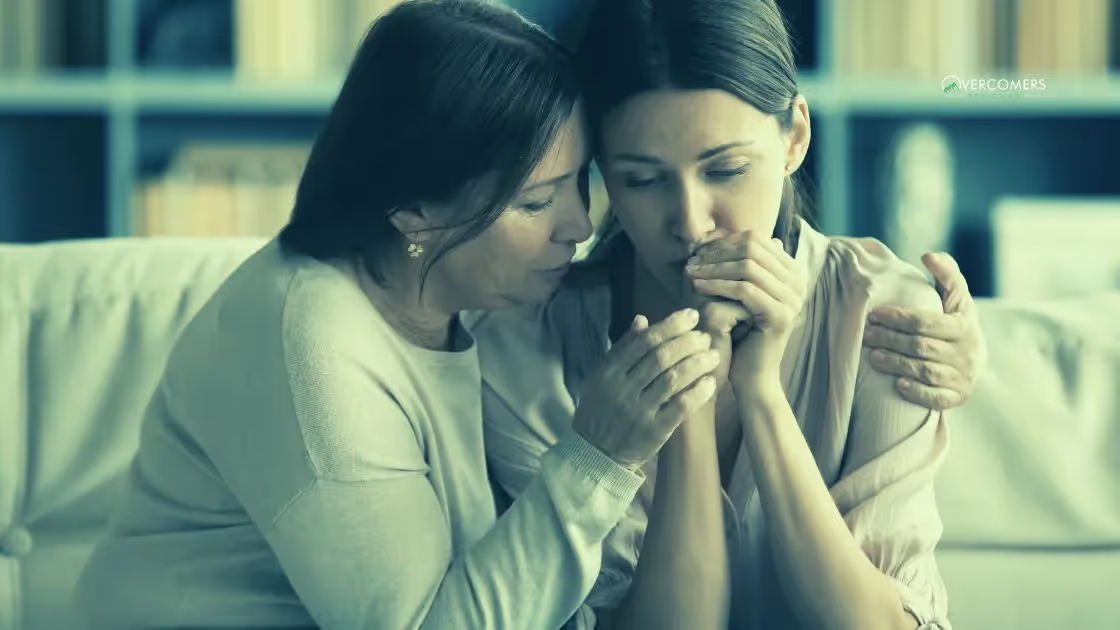The pain of losing a partner is intense and unique. It is hard to determine how someone will cope with the loss of their partner. As a parent of a grieving...

The pain of losing a partner is intense and unique.
It is hard to determine how someone will cope with the loss of their partner.
As a parent of a grieving child, you may find their emotions of loss puzzling at first, but what you can do for them is to provide them the support for the grief they need.
One way you can help them cope with the loss of their partner is by urging them to keep pushing forward.
When they can't be strong, be their strength.
Help them not give up on everything.
Be available to listen when they want to talk.
It may not happen every day, and they may keep sharing the same story every other day; nonetheless, be there for them.
Grieving and taking care of responsibilities can be hard; one of the two will suffer, and it's usually "the responsibilities" that suffer.
Stand in, in their place, when you can.
Let them know they can rely on you when they are unable to do things on their own.
Learn more about ways to help your child cope with the loss of their partner below.
Time alone doesn't cure grief.
Those who have suffered a loss become more adept at managing their sorrow over time.
When anyone loses their partner, no doubt, their life is altered.
The reality is that your child will get used to the new normal, but they will never be the same again.
After a significant other's death, the length of time spent in mourning is unpredictable.
However, eventually, you should urge your child to keep pushing forward and live their life in a manner that makes the most sense to them.
It's easy to get so lost in grief that you forget about everything else.
Be there to remind your child that there is still so much to live for.
We are all humans, and it's almost impossible to always get it right: however, by just being there, you're helping them cope with the loss of their partner.
Supporting your child is about being there for them when they need you, about asking how they're doing, and not disappearing when you think it's all over.
The way your child deals with sadness and pain may be different; nonetheless, it should be respected.
Learn to listen without inserting your own thoughts about how someone "should" or "should not" be feeling.
Be there to listen, talk about it, and encourage your child to do so; this can gradually help them cope with the loss of their partner.
Try to empathize with your child and understand what he or she really wants.
This may include the freedom to express their feelings over their partner's death as frequently as they want or feel the need to.
A very therapeutic effect may result from this.
Bereaved partners may feel helpless and hopeless after suffering such a devastating loss.
Therefore, it might be really beneficial to take a step back, slow down, and provide your child with calm support.
Providing practical assistance is useful.
This includes assistance with the kids, grocery shopping, cooking, and cleaning.
However, remember that the wants and needs of individuals vary greatly.
Make sure your act of kindness is what your child needs before you do it.
Even if it's for a few hours, giving a grieving person a break from caring for their young children may be invaluable.
As a grieving parent, it will be difficult to deal with both your children and how you are feeling.
This is because caring for others comes; first, it may be difficult for a grieving parent to take the time they need to work through their own grief emotions.
A bereaved parent would appreciate an offer to watch the children while they go to get some air or spend time away from everything overwhelming.

When a parent sees their child suffering, the natural response is to do anything they can to make them feel better.
You may feel helpless and hopeless when your child's spouse passes away, and you are unable to alleviate your child's pain.
The most difficult aspect of caring for a bereaved child is the feeling that nothing you do will help.
If you find that you can't comfort your grieving child at first, try not to take it personally.
Keep in mind that they have suffered a great loss.
Be patient with them.
Eventually, they may be able to talk and open up to you.
What you can do is tell them you love them and express your regret that you are unable to alleviate their pain during this time of loss.
You may feel that your child will never get over it.
Remember that the pain of loss will eventually lessen, but your support will always be valued.
Just knowing that you have someone there worrying about you can help you feel much better.
What you can do is empathize with your child and give them the space they need to mourn.
Some people are raised with the belief that they have to suppress their emotions and always act like everything is okay.
With grief, any emotions one feels or doesn't feel are up to them.
Nothing good has ever come from hiding emotions or suppressing them.
Understand that your child may react and cope with their loss in a different manner than you would expect or understand.
Even if we are mourning for the same person, our paths of loss and the methods in which we react will always be different.
If you want your child to feel supported in the same way you do, it's crucial to let them be without judging them while they express how they're feeling.
In order to assist your child cope with the loss of their partner, you should be flexible in accommodating their timing, information needs, and level of openness.
Whenever one partner dies, the other is left wondering what to do, who they are, and what the future holds.
What your child in such a difficult position could use is your unwavering compassion, support for grief, and comfort during their mourning.
More ways to help your child cope with the loss of their partner include: urging them to keep pushing forward, being available to listen, offering to help with responsibilities, understanding that you can't take away their pain, and understanding their grief.
https://www.hrrv.org/blog/7-ways-to-help-a-parent-who-has-lost-a-spouse/
https://www.joincake.com/blog/how-to-help-a-grieving-parent-who-lost-a-spouse/
https://time.com/5118994/advice-for-helping-grieving-friend/
https://www.funeralwise.com/grief/spouse-cope/
https://www.oddfellows.co.uk/news/supporting-someone-whos-lost-a-partner/
There is no "right" or "wrong" answer when it comes to how long grief will last in the elderly. For some people, the grieving process may last for several months or even years. For others, it may come in waves – they may have periods of intense grief followed by periods of relative calm. It's important to remember that everyone grieves in their own way and at their own pace.
It is not mandatory that all conversations revolve around the issue causing your grief but our therapists will provide guidance on how best to process the situation. You are in control of how much or little you want to share in a session, but it is important to stay open and honest with your therapist for optimal results.
There are a few things you should avoid saying to someone who is grieving, as they can come across as insensitive or unhelpful. For example, don't tell them that it's "time to move on" or that they "should be over it by now." It's also best not to make any assumptions about how they're feeling or what they need – instead, ask them directly how you can help.
It can be difficult to know what to say to someone who is grieving, but sometimes simply being there for them and offering your support can be helpful. You might try saying something like, "I'm here for you if you need to talk" or "I'm sorry for your loss." You could also offer to help with practical tasks such as running errands or cooking meals.
It is completely normal to feel dread or even fear when thinking about the upcoming holiday season. One way to ease your anxiety is by planning ahead and being prepared for how you will deal with tough moments. If there are certain events you know will be difficult, try to come up with an exit strategy beforehand so you can leave if needed. It can also be helpful to talk to a therapist or counselor before the holidays to help you manage your expectations and emotions.
Dealing with someone who is addicted to drugs or alcohol can be difficult. It is important to remember that addiction is a disease, and the addict is not responsible for their behavior. You can offer support and understanding, but it is important to set boundaries. You can also get help for yourself through therapy or counseling.